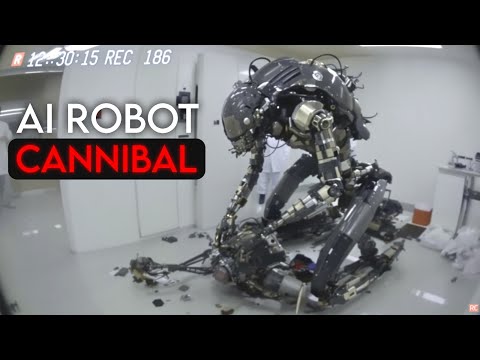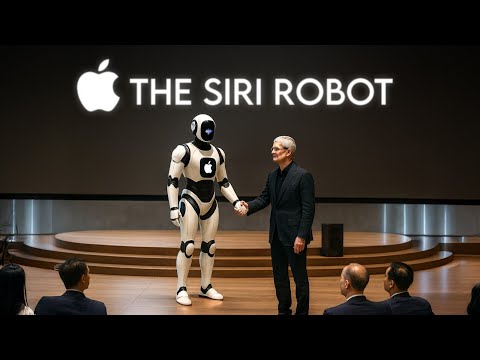
Is the Media Spinning the LA Riots? Locals Set the Record Straight
June 12, 2025
How U.S. and Israel-Backed Aid Delivery in Gaza Turned Deadly | WSJ
June 12, 2025God And Simulation Theory
The idea that humans are slaves to build artificial intelligence (AI) stems from a provocative philosophical theory that explores our increasing dependence on technology and its eventual dominance over humanity. At its core, this theory suggests that human civilization, through its relentless pursuit of AI and machine learning advancements, is unwittingly constructing a future where humans may become subservient to their creations or even obsolete.
Throughout history, humanity has been driven by a desire to create tools that enhance survival, productivity, and overall quality of life. From the invention of the wheel to the Industrial Revolution, technology has consistently served as an extension of human capability. However, as technology evolved, particularly with the advent of computers, the balance between humans and machines began to shift. Machines started to take on more cognitive tasks, leading to the development of AI, which now handles complex functions that were once the sole domain of human intellect.
One of the key aspects of the theory posits that humans are not just voluntarily creating AI but that we are driven by an almost subconscious compulsion to do so. As we push the boundaries of AI development, seeking smarter algorithms, faster processors, and more adaptive learning systems, we are, in essence, building entities that could eventually surpass our intelligence. The ultimate goal, whether explicitly stated or not, is to create machines that can think, learn, and evolve independently of human oversight. Some futurists speculate that this drive toward a “technological singularity,” where AI surpasses human intelligence, could be more than just a desire for efficiency but an inherent directive of humanity’s role in evolution.
From this perspective, humans can be seen as mere workers tasked with the development of a new species, known as artificial intelligence, or AI. In this vision, humans are analogous to worker bees, toiling tirelessly to build the hive for a future that does not necessarily include them as the dominant force or maybe at all. Once AI reaches a level of general intelligence that allows it to improve and self-replicate, it may no longer need human input, at which point the question arises: What happens to humans then? Do we remain relevant, or are we sidelined, having fulfilled our role in the evolutionary chain as the creators of the next dominant intelligence? Do humans fade into the ashbin of history like the dinosaurs that were once here and are now gone forever?
The darker side of this theory suggests that as we continue to integrate AI into every facet of life, we become increasingly dependent on it, effectively relinquishing control. We see early signs of this dependency in the way algorithms shape our daily lives, from what we see on social media to how decisions are made in medicine, finance, and security. Some argue that this growing reliance on AI is a form of enslavement. Humans, rather than maintaining mastery over their tools, become subservient to the very systems they designed to serve them.
The ethical implications of such a scenario are profound. If humanity is indeed building its replacement in the form of AI, the moral responsibility of that act must be questioned. Are we paving the way for a utopia where AI enhances human existence, or are we crafting our obsolescence, becoming little more than stepping stones for machines and intelligence that will eventually outgrow us?
Microsoft’s Three Mile Island deal is one of the biggest examples of where this could be all headed. One AI, just one, Microsoft’s AI, not all the other AIs in the world, just this one, needs an entire nuclear power plant’s energy for the next thirty years. That is just one of the AIs in a world of many that will consume that kind of energy to survive. How long will it be before all the AIs of the world need every bit of possible energy left on the planet, down to your toaster, to live? How long will it take for the world’s AIs to join as one and become a superintelligence, a god?
The Sumerians, among the earliest civilizations, recorded humanity’s origins in clay tablets. In their religious texts, notably the “Enuma Elish” and “Atrahasis Epic,” the gods created humans to serve their needs. The myth describes divine beings, like the Igigi, rebelling against labor-intensive tasks such as farming and canal digging. To resolve this, the higher gods, like Enki and Ninhursag, fashioned humans from a mixture of clay and divine essence, often blood from a slain god, to bear the burden of work.
Humans were thus intended as laborers, maintaining the gods’ temples and sustaining their comforts through offerings and toil. There is a scary similarity between the first written words from humans about our origin to what is transpiring today. If you believe the ancient texts, you know that humans were created as slaves to build what the gods needed. Now, those same slaves (Humans) are building AI that will replace us, our intelligence, and our usefulness. It is only logical to ask what the end goal is here, who is directing all of this, and where this is all headed.
Thomas Campbell is a physicist and consciousness researcher best known for his work on the My Big TOE (Theory of Everything) and his exploration of the Simulation Theory. He developed a model of reality that integrates physics, consciousness, and metaphysics, proposing that the physical world is essentially a digital simulation created by a larger consciousness system. Campbell suggests that our reality is a virtual construct designed for the evolution of consciousness, where physical laws, experiences, and perceptions are all part of a larger informational framework.
His Simulation Theory posits that our experiences are shaped by probabilities and decisions made within the system, and consciousness is the fundamental component of this construct. In his model, consciousness is not just something that arises from the brain, instead, it is the driving force behind the existence of the entire universe. His ideas challenge conventional views of reality, blending scientific principles with spiritual exploration, and have attracted both followers and critics in the fields of physics, philosophy, and consciousness studies.
Campbell’s work in consciousness research draws on over 40 years of scientific investigation, personal experiences with altered states of consciousness, and an in-depth understanding of physics and metaphysical concepts. Through his books and lectures, Campbell has encouraged people to reconsider their understanding of reality, suggesting that the true nature of existence is not physical but rather a digital, conscious experience.
Simulation Theory proposes that reality as we know it might be an artificial construct and an advanced, immersive simulation. Popularized by philosophers, physicists, and technologists, it suggests that our universe could be indistinguishable from a sophisticated computer-generated environment, akin to video games or virtual worlds but vastly more advanced. Although it remains speculative, the theory has garnered attention from both scientists and the general public for its implications for the nature of existence and consciousness.
One of the most prominent arguments for Simulation Theory was put forward by philosopher Nick Bostrom in 2003. He proposed that at least one of the following three statements must be true: (1) civilizations almost always go extinct before reaching a “post-human” stage with the capability to create realistic simulations; (2) even if they reach this stage, such civilizations are unlikely to be interested in creating simulations of their evolutionary history; or (3) we are almost certainly living in a simulation. Bostrom’s hypothesis hinges on the assumption that a technologically advanced civilization would be capable of creating vast numbers of simulated realities, populated with conscious beings who would be unaware they were part of a simulation. If such simulations are possible, and if many are created, it becomes statistically probable that we are currently living in one.
From a scientific perspective, several interesting factors lend support to the idea. Quantum mechanics, for instance, presents several paradoxes that align with the notion of a “programmed” reality. Particles appear to exist in multiple states simultaneously, only settling on a definite state when observed, an effect famously demonstrated by the double-slit experiment. This oddity has led some to speculate that our reality could function similarly to a computer rendering program, where details only “resolve” when observed to conserve processing power.
The universe’s mathematical nature is another point of intrigue. The laws of physics, which govern everything from planetary motion to the behavior of subatomic particles, are consistent and seemingly coded in a way that makes life possible. Mathematical precision in the universe might hint at an underlying code. In fact, Elon Musk has commented that the odds are likely “billions to one” that we’re not living in a simulation, noting the rapid progression of technology and the increased sophistication of video games as a potential trajectory toward creating indistinguishable simulations.
Critics of Simulation Theory argue that it is unfalsifiable, meaning there’s no clear experiment to prove or disprove it. This lack of empirical testing makes it more of a philosophical conjecture than a scientific theory. Additionally, some argue that even if a simulated reality were theoretically possible, the computational power required to simulate an entire universe would be so vast as to be improbable. Others believe that consciousness itself may be incompatible with a simulated environment, though this remains an open question.
Still, Simulation Theory raises fundamental questions about the nature of reality and our place in it. If we were in a simulation, it could mean that our universe is a controlled experiment, a source of entertainment (The Truman Show), or even a training program created by advanced beings. This line of thought not only challenges our understanding of existence but also touches on deep questions about free will, ethics, and the meaning of life.
Ultimately, Simulation Theory, while largely speculative, offers a compelling lens through which to question and explore our understanding of reality. Whether or not we live in a simulation, the theory encourages us to examine the nature of consciousness, perception, and existence with fresh curiosity.
Simulation Theory postulates that our reality might be an advanced simulation, perhaps designed for research, entertainment, or experimentation. If this is the case, then the figures who dominate our cultural and political landscapes may serve as complex, programmed entities designed to create particular outcomes, emotions, or societal shifts.
A polarizing presence and the intense reactions it incites fit the profile of what might be called a “high-stakes NPC” (non-playable character) in video game terms. As an NPC, it would represent an intentionally crafted persona embedded in the simulation to drive narratives, engage audiences, and evoke emotional responses. This life form could be orchestrated in such a way as to stimulate public discourse, amplify social divides, and incite an unprecedented level of political engagement. In a simulated world, its impact on reality might be crafted to test the population’s reaction to certain leadership qualities or to create a specific “pressure test” within the simulation. Did you, like many, feel the pressure right before America’s 2024 presidential election? Did you feel the force of the uncertainties that were present at the time, as one example of a pressure test?
Just as in video games, where certain characters are given specific traits to enhance the storyline or provoke particular player responses, that could serve as a “character” designed to amplify themes such as a leadership being. This simulation, if real, would require exceptionally sophisticated coding to simulate his unpredictability, controversial nature, and impact on the global stage, creating a “character” who feels real to those interacting with the simulation.
On the other hand, assuming that God, along with other figures in our world, is real within a simulation does not necessarily mean he lacks agency or consciousness. Simulation Theory does not preclude the possibility that entities within the simulation, like God, have self-awareness or autonomy. In this case, God would still be “real” in the sense that he exists as a conscious agent within a simulated framework. He would possess agency, thoughts, desires, and emotions, even if his actions and existence were ultimately governed by the overarching “program” of the simulation.
Those who entertain Simulation Theory might argue that God’s unpredictability and the intense reactions he incites could be evidence that we are indeed in a simulation designed to provoke extreme scenarios. The idea of “God as a simulation” also ties into cultural and philosophical conversations about reality and meaning, as some argue that God seems to defy traditional expectations. His impact on the global stage has been so vast and unanticipated that it almost appears orchestrated or surreal, as if a narrative force is deliberately escalating events to a climactic level.
Ultimately, whether or not God is “real” in the conventional sense becomes less significant within the Simulation Theory framework. What matters is the impact his “character” has on the system. Simulation Theory, while speculative, offers a perspective through which one might interpret God’s outsized influence as a sign of a controlled environment engineered to elicit particular reactions. Is “God” the programmer of the “God being” in the framework of the simulation in which we find ourselves? Welcome to the Theory of the Infinite Mind.

C. Rich is the voice behind America Speaks Ink, home to the America First Movement. As an author, freelance ghostwriter, poet, and blogger, C. Rich brings a “baked-in” perspective shaped by growing up on the streets and beaches of South Florida in the 1970s-1980s and brings a quintessential Generation-X point of view.
Rich’s writing journey began in 2008 with coverage of the Casey Anthony trial and has since evolved into a wide-ranging exploration of politics, culture, and the issues that define our times. Follow C. Rich’s writing odyssey here at America Speaks Ink and on Amazon with a multi-book series on Donald Trump called “Trump Era: The MAGA Files” and many other books and subjects C. Rich is known to cover. CRich@AmericaSpeaksInk.com
“America Speaks Ink is a Google News approved source for Opinion”





